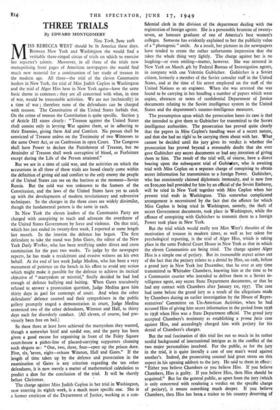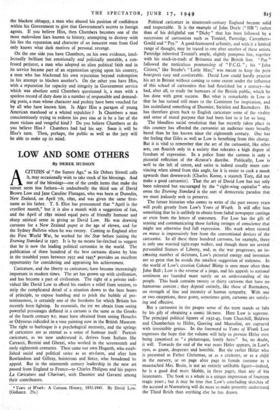THREE TRIALS
By EDWARD MONTGOMERY
New York, how loth MISS REBECCA WEST should be in America these days. Between New York and Washington she would find a veritable three-ringed circus of trials on which to exercise her reporter's talents. Moreover, in all three of the trials now monopolising front pages of American newspapers she would find much new material for a continuation of her study of treason in the modern age. All three—the trial of the eleven Communist leaders in New York, the trial of Miss Judith Coplon in Washington and the trial of Alger Hiss here in New York again—have the same basic theme in common ; they are all concerned with what, in time of war, would be treasonable activities. We are not (technically) in a time of war ; therefore none of the defendants can be charged with treason. The Constitution of the United States forbids that. On the crime of treason the Constitution is quite specific. Section 3 of Article III states clearly : " Treason against the United States shall consist only in levying War against them, or in adhering to their Enemies, giving them Aid and Comfort. No person shall be convicted of Treason unless on the Testimony of two Witnesses to the same Overt Act, or on Confession in open. Court. The Congress shall have Power to declare the Punishment of Treason, but no Attainder of Treason shall work corruption of blood, or Forfeiture except during the Life of the Person attainted."
But we arc in a time of cold war, and the activities on which the accusations in all three of these trials are based clearly come within the definition of giving aid and comfort to the only enemy the people of the United States can see on the horizon at the moment—Soviet Russia. But the cold war was unknown to the framers of the Constitution, and the laws of the United States have yet to catch up with the developments of modern revolutionary and subversive • techniques. So the charges in the three cases are widely dissimilar, though the fundamental pattern is the same in each.
In New York the eleven leaders of the Communist Party are charged with conspiring to teach and advocate the overthrow of the United States Government by force and violence. On that trial, which has just ended its twenty-first week, I reported at some length last month. In the interim the defence has begun. The first defendant to take the stand was John Gates, the editor of the New York Daily Worker, who has been testifying under direct and cross examination for the past two weeks. To judge by the newspaper reports, he has made a recalcitrant and evasive witness on his own behalf. At the end of last week Judge Medina, who has been a very monument of patience on the bench in his effort to avoid any action which might make it possible for the defence to achieve its tactical objective of " martyrdom or mistrial," finally decided he had had enough of defence bullying and baiting. When Gates truculently refused to answer a prosecution question, Judge Medina gave him thirty days in gaol for contempt of court. And when the other defendants' defence counsel and their sympathisers. in the public gallery promptly staged a demonstration in court, Judge Medina sentenced two of the other defendants, Winston and Hall, to thirty days each for disorderly conduct. (All eleven, of course, had pre- viously been free on bail.) So these three at least have achieved the martyrdom they wanted, though a somewhat brief and sordid one, and the party has been given a good excuse for organising in front of the Foley Square court-house a picket-line of placard-carrying supporters chanting such slogans as : " One, two, three, four—open up the prison door. Five, six, 'seven, eight—release Winston, Hall and Gates." If the length of time taken up by the defence and prosecution in the examination of Gates is any criterion regarding the ten other defendants, it is now merely a matter of mathematical calculation to predict a date for the conclusion of the trial. It will be shortly before Christmas.
The charge against Miss Judith Coplon in her trial in Washington, now entering its eighth week, is a much more specific one. She is a former employee of the Department of Justice, working as a con- fidential clerk in the division of the department dealing with the registration of foreign agents. She is a personable brunette of twenty- seven, an honours graduate of one of America's best women's colleges. Someone has evidently explained to her the publicity value of a " photogenic " smile. As a result, her pictures in the newspapers have tended to create the rather unfortunate impression that she takes the whole thing 'very lightly. The charge against her is no laughing---or even smiling—matter, however. She was arrested in New York on March 4th by Federal Bureau of Investigation agents, in company with one Valentin Gubitchev. Gubitchev is a Soviet citizen, formerly a member of the Soviet consular staff in the United States, and at the time of his arrest employed on the staff of the United Nations as an engimeer. When she was arrested she was found to be carrying in her handbag a number of papers which were copies, abstracts or notes of confidential Department of Justice documents relating to the Soviet intelligence system in the United States and the department's counter-intelligence measures.
The presumption upon which the prosecution bases its case is thaf she intended to give them to Gubitchev for transmittal to the Soviet intelligence authorities. The prosecution has proved quite clearly that the papers in Miss Coplon's handbag were of a secret nature, and that she had no right to be-carrying them about with her. What. cannot be decided until the jury gives its verdict is whether the prosecution has proved beyond a reasonable doubt that she ever gave Gubitchev any secret documents or had any, intention of giving them to him. The result of the trial' will, of course, have a direct bearing upon the subsequent trial of Gubitchev, who is awaiting trial with Miss Coplon on a separate charge of conspiring to obtain secret information for transmission to a foreign Power. Gubitchev, who has consistently claimed diplomatic immunity, and is now free on $zoo,000 bail provided for him by an official of the Soviet Embassy, will be tried in New York' together with Miss Coplon when her present trial ends in Washington. This somewhat complicated arrangement is necessitated by the fact that the offence for which Miss Coplon is being tried in Washington, namely, the theft of secret Government documents, took place in Washington, while the offence of conspiring with Gubitchev to transmit them to a foreign Power took place in New York.
But the trial which would really test Miss West's theories of the motivation of treason in modern times, as well as her talent for psychological reporting, is the trial of Alger Hiss, which is taking place in the same Federal Court House in New York as that in which the eleven Communists are being tried. The charge against Alger Hiss is a simple one of perjury. But its treasonable aspect arises out of the fact that the perjury relates to a denial by Hiss, on oath, before a grand jury in New York last December, that he ever at any time transmitted to Whittaker Chambers, knowing him at the time to be a Communist courier' Who intended to deliver them to a Soviet in- telligence agent, any secret State Department documents, or that he had any contact with Chambers after January 1st, 1937. The case had come before the grand jury as a result of the allegations made by Chambers during an earlier investigation by the House of Repre- sentatives' Committee on Un-American Activities, when -he had accused Hiss of giving him secret information in the period from 1936 to 1938 when Hiss was a State Department official. The grand jury accepted Chambers's testimony as establishing a prima facie case against Hiss, and accordingly charged him with perjury for his denial of Chambers's charges.
But the real fascination of this trial lies not so much in its rather sordid background of international intrigue as in the conflict of the two major personalities involved. For the public, as for the jury in the trial, it is quite literally a case of one man's word against another's. Indeed, the prosecuting counsel laid great stress on this aspect in his opening address to the jury. He said to them in effect : " Either you believe Chambers or you believe Hiss. If you believe Chambers, Hiss is guilty. If you .believe Hiss, then Hiss should be acquitted." But for the general public, as apart from the jury (which is only concerned with rendering a verdict on the specific charge of perjury), it means something much deeper. If you believe Chambers, then Hiss has beach a traitor to his country deserving of
-the blackest obloquy, a man who abused his position of confidence within his Government to give that Government's secrets to foreign agents. If you believe Hiss, then Chambers becomes one of the most malevolent liars known to history, attempting to destroy with his lies the reputation and character of an innocent man from God only knows what dark motives of personal revenge.
On the one side you have Chambers, on his own evidence, intel- lectually brilliant but emotionally and politically unstable, a con- fessed perjurer, a man who adopted an alien political faith and in its service became part of an organisation spying upon his country, a man who has blackened his own reputation beyond redemption in his attempt to blacken another's. On the other you have Hiss, with a reputation for capacity and integrity in Government service which was absolute until Chambers questioned it, a man with a spotless record of duty done in a number of responsible and demand- ing posts, a man whose character and probity have been vouched for by all who have known him. Is Alger Hiss a paragon of young American manhood or a whited sepulchre ? Is Chambers a man conscientiously trying to redeem his past sins or is he a liar of the most vicious and vengeful kind ? Do you believe Chambers or do you believe Hiss ? Chambers had had his, say. Soon it will be Hiss's turn. Then, perhaps, the public as well as the jury will be able to make up its mind.







































 Previous page
Previous page